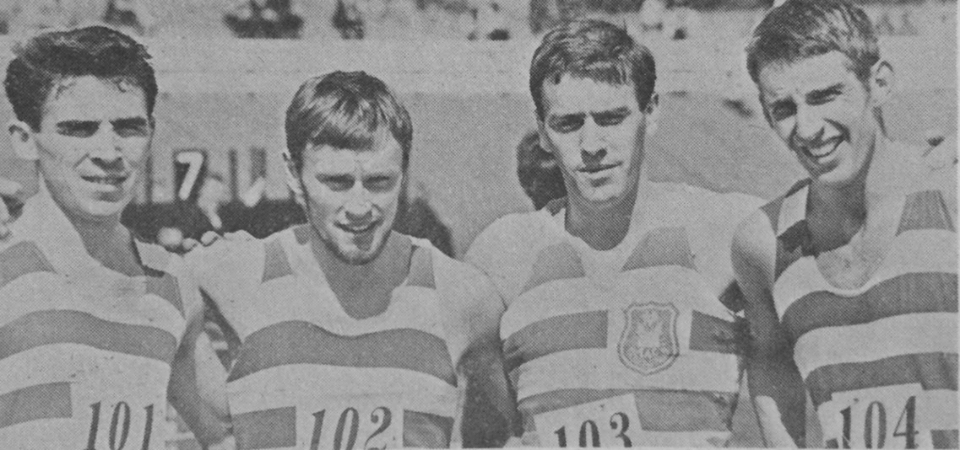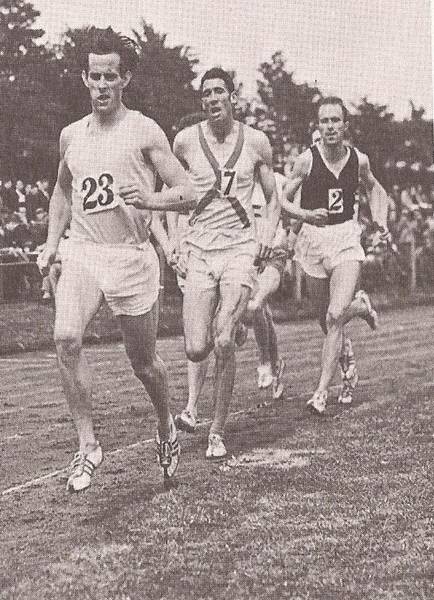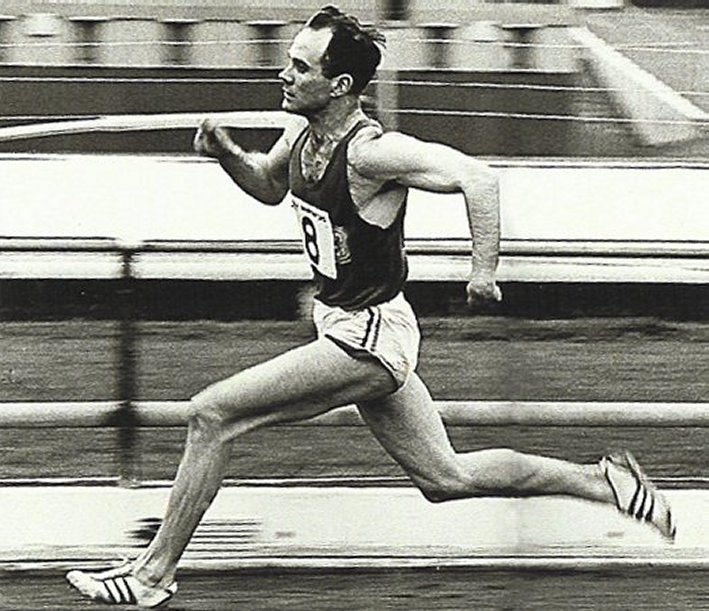The Victoria Park medley relay team after the AAA’s championships at Kirkby in 1957
The relay had been farmed out to the Shotts Highland Games held on the first Saturday in September in 1959. It was an unfortunate date and venue for the event and looked more like a desire to get the event away from the national championship in June. Why so? Well, the time of year was not one where the warm weather needed for good championship standard racing would be very likely. Nor was the choice of venue one that would maximise spectator numbers: Shotts was always a good meeting and one that was well supported by runners from the central belt and often from the north of England but very difficult for athletes from such places as Dundee, Aberdeen, and so on to get to. The track was a narrow one where getting more than three teams to run in lanes would be virtually impossible, the consistency of the track was variable and it sloped won in the back straight and up in the home straight. But Shotts had always been a popular meeting and it had for some time featured a medley relay. In 1957 it had been won by a Glasgow University team ed off by Scottish half mile champion J Boyd and in 1958 the winners were a well balanced Clydesdale Harriers team of Bobby Clark, John Aird, George Rodger and Bill Purdie.
lThe first national championship there was held on 5th September, 1959, and the winners were Shettleston Harriers. Given a substantial lead by Graham Everett, the team also had to runners who had been members of the club team that had been runners up in the AAA junior sprint relay championship. The result was a win for the Glasgow club in 3:41.2 from Edinburgh Southern Harriers and Victoria Park AAC.
It was, however, held on 3rd September, 1960, and the reigning champions, Shettleston did not run. The race was won by Edinburgh Southern Harriers whose lead runner over the half mile was Kenny Ballantyne who handed over a five yard advantage from Bellahouston Harriers and Victoria Park which the remaining team members – RD Cockburn, J Togher and C Watson – were able to maintain. The winning time was 3 minutes 36.2 seconds. It was not much faster than when they had previously won it in 1948 (3:36.8) and slower than the best pre-war time of 3:32.9 run by Bellahouston Harriers in 1938.
*
Southern were back the following year (1961) when the relay was held again at Shotts and faced fairly strong opposition. The report in the ‘Glasgow Herald’ read as follows: “One of the closest races at Shotts Highland Games held at Hannah Park was the Scottish Mile Medley Relay championship. Bellahouston Harriers won by two yards in the good time of 3 minutes 38.8 but their success was by no means assured until the final lap. With Bellahouston third and 12 yards behind the leaders, Ayr Seaforth AC, at the three-quarter mile mark, young R Greig made such good progress that he overtook and beat the runners ahead of him including JR Boyd (Ayr) the holder of the half-mile record. Some watches showed that young Greig had returned his personal best time of 50.3.” The order at the finish was 1. Bellahouston Harriers (J Currie, R Rae, R Steele, R Greig); 2. Edinburgh Southern Harriers; 3rd Ayr Seaforth AC.
Jim McLatchie
Number 7 in the Ayr Seaforth vest
There were many outstanding athletes at Shotts in 1962 including WM Campbell, JP McLatchie, John Anderson and JJ Hillen (of Saltwell), Hugh Barrow, JP McLatchie and many more when the Medley Relay Championships were again held at Hannah Park. Victoria Park AAC had won the event in four consecutive years between 1952 and 1956. The club were generally good relay runners with SAAA titles in all varieties – 4 x 100, 4 x 440 and medley. This year they had a very good team out led off by the prodigious young Hug Barrow against strong tams from Ayr Seaforth and Bellahouston. On the first stage McLatchie beat Barrow home and Ayr led the field until the final quarter-mile stage when A Ballantyne caught and passed the very good young Ayrshire runner JC Stewart who was the reigning Junior 440 yards champion. Finishing order was Victoria Park from Ayr Seaforth with Bellahouston Harriers third. Winning time was 3 minutes 34 seconds.
*
7th September 1963, saw the Shotts Highland Games host the medley relay championships for men and women once again but this time, it was pointed out by the Press that the defending champions Victoria Park had turned out a weakened team because their leading half-milers were engaged elsewhere. After coming so near to winning in 1962. the Ayr Seaforth team made no mistake this time round. They led throughout and defeated Bellahouston Harriers by three yards in 3 minutes 38 seconds – four whole seconds slower than the VP team of the previous year. Their team consisted of J Davidson, C Stewart, R McCrindle and R Billson. Bellahouston were second and the Edinburgh team of Octavians was third.
In 1964, the title was won by the Glasgow University team that was really flying high and with a team containing Brian Scobie and Ming Campbell won the title for the first time since 1950. It was a slightly different scenario in 1965. On another wet afternoon in Shotts – the weather over the years had not been kind to the meeting – the University squad of Scobie, Campbell, McGeoch and Barclay Kennedy had to give best to the Bellahouston Harriers team. Mike McLean was the lead off runner for the Harriers and was 20 yards plus upon Scobie at the end of the half-mile stage. H Robertson, W Robertson and Hugh Baillie maintained the lead and the University had lost the title. They won by 25 yards with Dumbarton AAC third.
In 1966, once it was known that Scotttish 440 yards champion Hugh Baillie was not running for Bellahouston the club was regarded as joint favourite with Edinburgh’s Octavians club. W Robertson, normally a 220 yards runner, stepped up to the quarter mile leg and the club won from Octavians and Edinburgh AC. The winning time was 3:32.1 and the team was composed of M McLean, J Williams, W Carmichael and W Robertson.
In 1967, Baillie was back in the team and maybe wished he weren’t. I quote the report in the ‘Glasgow Herald’.
“One Scottish title was settled – and in the most frustrating manner possible for the former holders, Bellahouston. Victoria Park, having been second in the AAA’s Championships earlier in the year, were favourites even without the services of P Hepburn, one of their 220y runners. An unconvincing first leg (880 yards) by WH Barrow left Victoria Park with only a slight lead, and as the last leg (440 yards) was about to begin, they had at most a yard in hand over Bellahouston, although – enough we thought, for H Baillie (Bellahouston) to catch RT Laurie. In a scrambled changeover, however, Baillie was knocked prostrate on the track by an incoming opponent, Laurie was gone, unaware of his rival’s bad luck, and he raced home a clear winner.
The blame really rests with an association which can award the holding of a national event to a meeting whose track has no lane markings, and is approximately 17 feet wide instead of at least 24. “
The final result was first, Victoria Park AAC in 3:4.8 with a team of WH Barrow, A Wood, J Duguid and RT Laurie from Edinburgh AC in 3:36.8 and Bellahouston in 3:37.3.
Whoever was responsible for Baillie’s tumble, The outcome for Shotts Highland Games was a bad one. This was the last year that the SAAA One Mile Medley Relay was held at Hannah Park. Complain as the reporter might, it was the longest period since the War that the relay had been held at the one venue – nine championship races in all. The 1968 relay was won by Bellahouston in a time of 3:37.8 to give them three championships in four years – it might so easily have been four in four.
1968 was also the last year in which the medley relay was an imperial mile distance: with the Empire and Commonwealth Games coming in 1970, all track distances became metric. The medley relay was now a 1600m event and the first was won by the quartet at the top of the page in 1969.


